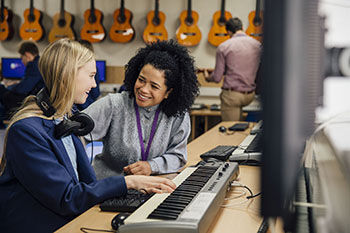Researchers make key recommendations for the future of music education
Research by Birmingham City University has revealed the positive impact of music education on young people at risk of educational exclusion.

Commissioned by national music charity Youth Music, the four-year research project titled ‘Exchanging Notes’ found that young people at risk of exclusion at the outset of the programme maintained high levels of attendance (>95 per cent) throughout the project.
There was an increase in participants performing above expectation in Maths and English over the course of the programme, from 14 per cent to 21 per cent and 15 per cent to 28 per cent of participating pupils respectively.
The study, launched at the University’s Faculty of Health, Education and Life Sciences on Wednesday 22 May, also found that the programme helped some young people who had previously been excluded to re-enter mainstream education.
The project started by looking at young people’s music interests and brought music genres such as grime and hip-hop into the classroom with the help of music industry professionals and local music-making projects.
It includes 14 recommendations for 21st century music education and highlights the importance of music education for young people at risk of educational exclusion.
The need for partnership working between schools and out-of-school music education providers for this new model of teaching music is highlighted in the recommendations.
Dr Victoria Kinsella, Senior Research Fellow at Birmingham City University, explained: “During the four years of 'Exchanging Notes', project partners re-evaluated what it means to be and to become a musician.
Music education, music industries and music sit at the heart of Birmingham City University’s creative offering, with courses at Royal Birmingham Conservatoire, Birmingham School of Media and the institution’s School of Computing and Digital Technology enabling students to pursue careers both on and off stage.
Matt Griffiths CEO of Youth Music said: “We believe our proposed new model is a win-win for all partners – including schools, Music Education Hubs, music industry, multi-agency partners and local music-making projects – and most importantly young people.
“Schools can offer an inspirational music curriculum that better supports social and emotional wellbeing; the music industry talent pipeline grows and is more diverse; and young people’s lives in music are completely connected both in and out of school.”
The full report is available to read online.